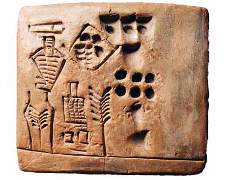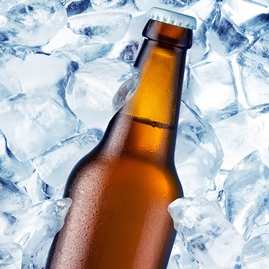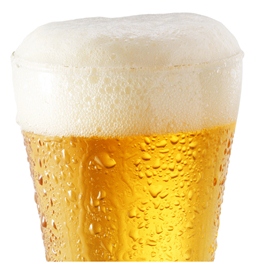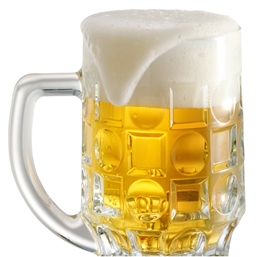
Beer is the world's most widely consumed and probably the oldest of alcoholic beverages; it is the third most popular drink overall, after water and tea.
It is produced by the brewing and fermentation of starches, mainly derived from cereal grains—most commonly malted barley, although wheat, maize (corn), and rice are widely used. Most beer is flavoured with hops, which add bitterness and act as a natural preservative, though other flavourings such as herbs or fruit may occasionally be included. Some of humanity's earliest known writings refer to the production and distribution of beer: the Code of Hammurabi included laws regulating beer and beer parlours, and "The Hymn to Ninkasi", a prayer to the Mesopotamian goddess of beer, served as both a prayer and as a method of remembering the recipe for beer in a culture with few literate people. Today, the brewing industry is a global business, consisting of several dominant multinational companies and many thousands of smaller producers ranging from brewpubs to regional breweries.
The basics of brewing beer are shared across national and cultural boundaries. Beers are commonly categorized into two main types—the globally popular pale lagers, and the regionally distinct ales,[9] which are further categorized into other varieties such as pale ale, stout and brown ale. The strength of beer is usually around 4% to 6% alcohol by volume (abv) though may range from less than 1% abv, to over 20% abv in rare cases.
Beer forms part of the culture of beer-drinking nations and is associated with social traditions such as beer festivals, as well as a rich pub culture involving activities like pub crawling and pub games such as bar billiards.
History
Beer is one of the world's oldest prepared beverages, possibly dating back to the early Neolithic or 9000 BC, and is recorded in the written history of ancient Egypt and Mesopotamia. The earliest known chemical evidence of beer dates to circa 3500–3100 BC from the site of Godin Tepe in the Zagros Mountains of western Iran. Some of the earliest Sumerian writings found in the region contain references to a type of beer; one such example, a prayer to the goddess Ninkasi, known as "The Hymn to Ninkasi", served as both a prayer as well as a method of remembering the recipe for beer in a culture with few literate people. The Ebla tablets, discovered in 1974 in Ebla, Syria and date back to 2,500 BC, reveal that the city produced a range of beers, including one that appears to be named "Ebla" after the city. A beer made from rice, which, unlike sake, didn't use the amylolytic process, and was probably prepared for fermentation by mastication or malting, was made in China around 7,000 BC.
history of ancient Egypt and Mesopotamia. The earliest known chemical evidence of beer dates to circa 3500–3100 BC from the site of Godin Tepe in the Zagros Mountains of western Iran. Some of the earliest Sumerian writings found in the region contain references to a type of beer; one such example, a prayer to the goddess Ninkasi, known as "The Hymn to Ninkasi", served as both a prayer as well as a method of remembering the recipe for beer in a culture with few literate people. The Ebla tablets, discovered in 1974 in Ebla, Syria and date back to 2,500 BC, reveal that the city produced a range of beers, including one that appears to be named "Ebla" after the city. A beer made from rice, which, unlike sake, didn't use the amylolytic process, and was probably prepared for fermentation by mastication or malting, was made in China around 7,000 BC.
As almost any substance containing carbohydrates, mainly sugars or starch, can naturally undergo fermentation, it is likely that beer-like beverages were independently invented among various cultures throughout the world. The invention of bread and beer has been argued to be responsible for humanity's ability to develop technology and build civilization. Beer was spread through Europe by Germanic and Celtic tribes as far back as 3000 BC, and it was mainly brewed on a domestic scale. The product that the early Europeans drank might not be recognised as beer by most people today. Alongside the basic starch source, the early European beers might contain fruits, honey, numerous types of plants, spices and other substances such as narcotic herbs. What they did not contain was hops, as that was a later addition first mentioned in Europe around 822 by a Carolingian Abbot and again in 1067 by Abbess Hildegard of Bingen.
Beer was spread through Europe by Germanic and Celtic tribes as far back as 3000 BC, and it was mainly brewed on a domestic scale. The product that the early Europeans drank might not be recognised as beer by most people today. Alongside the basic starch source, the early European beers might contain fruits, honey, numerous types of plants, spices and other substances such as narcotic herbs. What they did not contain was hops, as that was a later addition first mentioned in Europe around 822 by a Carolingian Abbot and again in 1067 by Abbess Hildegard of Bingen.
Beer produced before the Industrial Revolution continued to be made and sold on a domestic scale, although by the 7th century AD, beer was also being produced and sold by European monasteries. During the Industrial Revolution, the production of beer moved from artisanal manufacture to industrial manufacture, and domestic manufacture ceased to be significant by the end of the 19th century. The development of hydrometers and thermometers changed brewing by allowing the brewer more control of the process and greater knowledge of the results.
Today, the brewing industry is a global business, consisting of several dominant multinational companies and many thousands of smaller producers ranging from brewpubs to regional breweries. As of 2006, more than 133 billion liters (35 billion gallons), the equivalent of a cube 510 metres on a side, of beer are sold per year, producing total global revenues of $294.5 billion (£147.7 billion).
Beer ingredients
All types of ale and beer are brewed from 4 basic ingredients:
Malt
Hops or alternative natural flavouring
Water
Beer yeast
MALT
Malt is the main ingredient that is used for making beer and of the 5 cereals (barley, wheat, oats, maize and rice) barley is mainly used because it produces the best malt and flavour. The most popular malted barley used in home beermaking is pale malt. The quantity of malt used in a brew affects the fullness, flavour and alcohol level of the beer. A beer can be improved further by adding some cereal grains.
HOPS
Hops add bitterness to the beer and improve its keeping properties. Many varieties are available, but fuggles and goldings are the most popular for brewing beer, ale and stout and saaz and hallertau for lagers.
WATER
Few beer drinkers appreciate that beer is nearly all water. Even the very strongest of brews contain around 90% water. Yet have you ever wondered why certain parts of the country should have become established as important centres of the brewing industry? Why, for instance, should Burton-on-Trent be famed for it’s pale ales and bitters, whereas Dublin and London are renowned for their mild ales and stouts? The reason, quite simply, is the quality of the water locally. In brewing, water greatly influences the final flavour of the product. Hard water is generally preferred for brewing light ale and bitter, but soft water is preferred for mild ale and stout.
If you care to add chemicals to your brew, the water can be adjusted by adding Epsom salts (magnesium sulphate) to give hardness to the water or salt (sodium chloride) to soften the water and round the brews flavour. If you brew kit beers, the water quality is simply not worth fussing over, your domestic supply is good enough.
YEAST
Beer yeast is available as granules in single packets or in pots. Yeast ferments rapidly converting the natural sugar (maltose) with any added household sugar (sucrose) to produce alcohol and carbon dioxide.
Top fermenting beer yeasts are the most common used today as they are used in all British type beers and most of the beers of Europe. There are a variety of ale yeasts available, each having a different characteristic and imparting extra flavour to your brew. These yeasts work best at a temperature of 18-24C (65-75F).
Bottom fermenting lager yeast gives a unique taste to lager. As lager yeast is bottom fermenting, all the activity is at the bottom of the bucket and the beer may look like it is not working. These yeasts can also work at a lower temperature than general yeasts.
Health Benefits of Beer
In moderation, beer has many health benefits:
- Up to two beers a day for men (women should only have one), will help to reduce your risk of having strokes, and heart disease. Light drinking appears to reduce the risk by as much as 20% according to research in United States.
- Beer can help to increase the level of HDL (beneficial cholesterol) in the body and decrease the likelihood of blood clots.
- A couple of beers can raise the level of anti-oxidants in the blood stream. This enables the cells to carry more oxygen around the body. More oxygen helps better muscle activity among other things.
- Beer contains vitamin B6 which is needed to make haemoglobin, the red coloring in blood. This carries oxygen around the body. It also helps maintain correct blood sugar levels.
- It is fat free, aids restful sleep and promotes relaxation.
- Beer contains a similar amount of polyphenols (antioxidants) as red wine and 4-5 times as many polyphenols as white wine.
- Beer contains vitamins B and B2 (as well as B6) and essential minerals like calcium, potassium, and phosphorus.
- Dark beer is better for you than light. It contains more flavanoids which are natural oxidants that help to protect the body from disease.
- For post menopausal women, beer may be a beneficial addition to the diet. Some hop flavanoids have properties like oestrogen and research suggests that this property may make it possible to produce a natural form of HRT to replace the current one.
- Beer can help to reduce blood pressure and levels of insulin in the blood.
- Beer contains folate that helps prevent anemia and helps maintain a healthy nervous system. Studies shown that people who drink beer show less decline in mental faculties as they get older compared to non-beer drinker
- Beer drinking can also reduce the incidence of kidney stones. This may be due to the water, the hops, or the alcohol, but, whatever the reason, it seems to help.
Beer improves metabolism, and many doctors consider that it is better to drink beer often (maybe every day), but with moderate portions (100-200 ml), than rarely but with huge portions.
Cancer preventer
A compound found only in hops, which are used to make beer, have been discovered to prevent cancer. Of course we all know that hops are an ingredient in beer and therefore Xanthohumol has high hopes of making beer a new anti cancer drug. Xanthohumol flavinoids have been tested and its use is hoped to be a preventative treatment against prostate and colon cancer and even may be a form of hormone therapy for women.
Getting your vitamins A friend of mine used to say there is a pork chop in every glass of beer but recent studies show that there is vitamin B6 in beer increases the level of vitamin B6 in a beer drinkers blood which has been shown to decrease the level of homocysteine which increase the chances of heart disease.
A friend of mine used to say there is a pork chop in every glass of beer but recent studies show that there is vitamin B6 in beer increases the level of vitamin B6 in a beer drinkers blood which has been shown to decrease the level of homocysteine which increase the chances of heart disease.
Beer strengthen bones
Beer is the main source of silicon. This mineral plays a large role in strength of bone and muscle system.
Reducing chance of heart disease
alcohol drinkers had higher levels of high-density lipoprotein (HDL) cholesterol, often called the “good” cholesterol, which is a protective form of blood fat. The alcohol drinkers also had lower levels of fibrinogen, a protein that promotes blood clots, as well as elevated levels of other molecules (platelets) that prevent the clotting and stickiness of blood cells.
Beer strengthens cordial muscle
There are lots of potassium, magnesium, phosphorus in beer and it is excellent prophylaxis of myocardial infarction (heart attack), hypertension and heart failure. And nonalcoholic beer and dark beer of some brands could decreases the possibility of blood coagulability and thus decreases the risk of clots formation.
Beer softens skin and enlarges breast
In XVI century pharmaceutical chemists recommended women to wash themselves with beer in order to have soft skin. And Prussian Queen Louise who had flat breast was advised to drink beer and smear her breast with beer three times per day.
Reduction in Kidney stones
A Finnish-U.S. study of beer-drinking, middle-aged men was published in the American Journal of Epidemiology in 1999. The report stated that an increase in beer consumption may reduce the risk of developing kidney stones. Results showed that there was a 40 percent lower risk of kidney stones in beer drinkers, but the researchers were stumped as to whether the results were due to water, alcohol or hops.
Beer hastens hair growth
And vitamins B and P affect hair growth. It is recommended to make nourishing masks from beer for hair once a week. And if you wet your clean hair with beer and then use hair rollers – after that you will get tight and bright ringlets.
Defying the bad of X-Ray
Beer helps reduce chromosomal damage from radiation exposure thanks to beta-pseudouridine. According to a study by the Japanese researchers from the National Institute of Radiological Sciences, and the Tokyo University of Science Blood samples were taken from test subjects before and after they had drunk about 630ml of beer. Apparently, when the samples were exposed to X-rays and other types of radiation, after the subjects had drank the beer their samples showed at least 30% fewer aberrations in the blood cells.
Beer is good while having cold
Beer has bactericidal behaviour, if you drink warm beer while having cold or flu, it is possible to recover faster. In Medieval times during plague and cholera epidemic brewery workers rarely were ill. And while having toothache before teeth were rinsed with beer.
Memory Booster
A Swedish team has shown that mice fed with moderate amounts of alcohol grew new nerve cells in the brain. The full implications of the Karolinska Institute research – which appears in the International Journal of Neuropsychopharmacology – are unclear, but Stefan Brene told the BBC: “We believe that the increased production of new nerve cells during moderate alcohol consumption can be important for the development of alcohol addiction and other long-term effects of alcohol on the brain.”
Slow the Aging Process
In a study published in the March issue of International Immunopharmacology, scientists at Austria’s Innsbruck Medical University found that hops, a key ingredient in beer, affect the production of neopterin, a telltale sign of inflammation, and levels of the amino acid tryptophan (low levels are associated with more inflammation.)
Beer withdraws uric stones
Many sorts of beer withdraw uric stones. It happens like that: potassium intensifies natrium and chlorine segregation by kidneys, and urine formation deeply increases. Thus demineralization of organism happens and uric stones are being withdrawn.
Keeps you Awake
Although there is no caffeine in Beer, beer was found to reduce neopterin production and suppress degradation of tryptophan, according to a study. (Tryptophan is also commonly cited as the reason people feel tired after gorging on Thanksgiving turkey.) This suppression might be connected with the calming effect of beer,” the researchers note, “since its normalizing effect on the tryptophan balance improves the availability of the ‘happiness hormone’ serotonin.”
study. (Tryptophan is also commonly cited as the reason people feel tired after gorging on Thanksgiving turkey.) This suppression might be connected with the calming effect of beer,” the researchers note, “since its normalizing effect on the tryptophan balance improves the availability of the ‘happiness hormone’ serotonin.”
Too much beer can make you fat, and cause a number of other health problems. Like all good things, beer should be consumed responsibly.
Culinary Uses:
Beer is used as marinades and tenderizer for red meat.
Beer is used as a substitute for water in different soups, stocks and sauces.
Note: When cooking with beer, keep your beer's primary taste in mind. Malty beers add a sweet/nutty taste while hop lagers can add a bitter/herbal flavor. Beer increases in bitterness as it reduces so use a sweeter/malty beer when cooking for long period of time.
Other Uses: Beer is an excellent conditioning rinse for your hair, smoothing the follicles to make your hair look healthier and fuller. Cold beer is especially effective at giving your hair a shine.
Health Risks from Beer
But what about the potential health risks from beer. Researchers are unanimous that pregnant or nursing women should not drink alcohol, since it can lead to Fetal Alcohol Syndrome. Alcohol can pass through the umbilical cord and through breast milk and affect the brain.
Weight gain can be an issue. Beer has no fat, but alcohol and the residual sugars in beer do contain calories. A glass of beer contains between 150-450 calories, depending on size and type. But that amount is lower by volume than apple juice or a similar glass of red wine.
The key, again, is moderation. Excessive drinking has long been known to cause liver damage, and can stress kidneys.
Beer has no caffeine but studies show that moderate coffee drinking helps alertness, a benefit at work and in driving. Heavy drinking obviously leads to less mental acuity and can increase the risk of traffic accidents as well as those around the home.
Amount is everything. Moderate consumption can be relaxing, reducing stress, a factor in several health issues. Excess drinking leads to drawbacks that outweigh the benefits.
Benefits derive from the alcohol, moderate amounts of B vitamins, helpful amounts of magnesium and selenium and other components. And beer is 90% water, which along with the alcohol helps flush kidneys. The brewing process and the alcohol also help kill bacteria in the water.
Naturally, no single article or study should be taken as definitive. But, limited to one to two 12-oz glasses per day, most studies suggest the benefits far outweigh the risks.
"Beer is proof that God loves us and want us to be happy."
Benjamin Franklin
"He was a wise man who invented beer."
Plato
"Beer ... a high and mighty liquor."
Tulius Caeser
Disclaimer: This website is for information purposes only. By providing the information contained herein we are not diagnosing, treating, curing, mitigating, or preventing any type of disease or medical condition. Before beginning any type of natural, integrative or conventional treatment regime, it is advisible to seek the advice of a licensed healthcare professional.
![]()



























